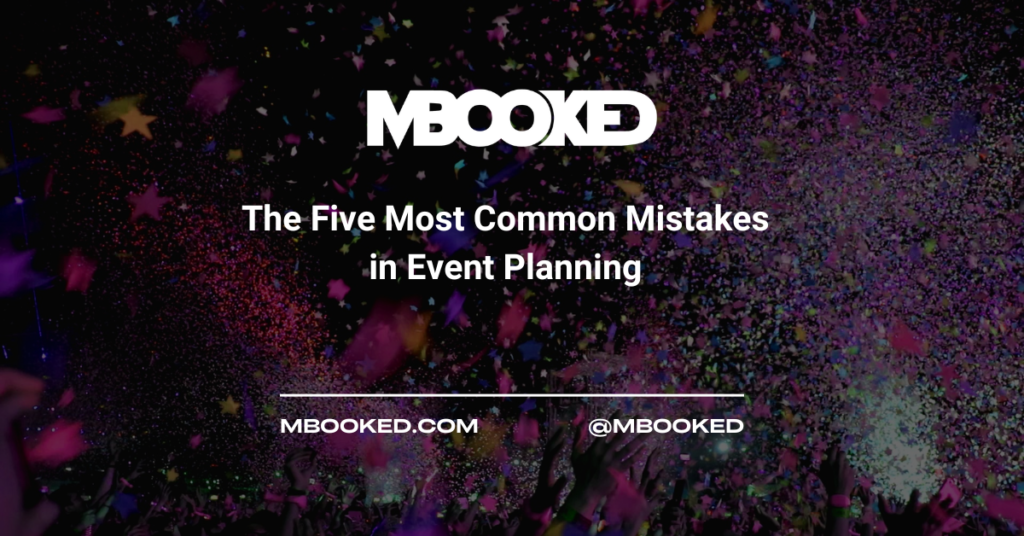Event planning can be an exciting but incredibly complex task. After 5 years of experience in the field, I’ve identified the five most common mistakes that can hinder the success of your event.
1. Lack of Detailed Planning
Underestimating the importance of detailed planning can lead to chaos. Ensure you have a clear schedule, budget, and task list that must be accomplished before the event. A structured timeline, precise allocation of responsibilities, and contingency measures are essential for the smooth running of any event. Without proper foresight and dedication to planning, even the most promising events can fall apart.
- Tip 1: Use project management tools or software. These can help in setting milestones, tracking progress, and ensuring everyone involved knows their responsibilities.
- Tip 2: Regularly review and adjust the plan. As the event date approaches, certain details might change. Regular reviews ensure you’re always working with the most current information.
2. Inappropriate Venue Selection
Choosing a venue that doesn’t fit your event can affect the atmosphere and satisfaction of attendees. Carefully analyse the number of guests, parking availability, technical equipment, and other key factors. The venue is more than just a place; it sets the tone for the entire event. It should resonate with the theme, be easily accessible, and offer amenities that cater to the comfort and convenience of your guests.
- Tip 1: Conduct a physical visit to the venue. Pictures and descriptions might not capture the complete essence or limitations of a space.
- Tip 2: Consider the acoustics and lighting. These factors can dramatically influence the ambiance of the event and attendee experience.
3. Neglecting Communication with Suppliers
Poor communication with suppliers can lead to misunderstandings and logistical problems. Regular meetings and clear guidelines are key to avoiding unpleasant surprises. Building a rapport and maintaining open channels of communication with your suppliers will not only ensure that everyone is on the same page but also foster a collaborative environment. When suppliers feel involved and informed, they are more likely to go the extra km.
- Tip 1: Set up a shared calendar or timeline. This helps in coordinating with suppliers about key dates and deliverables.
- Tip 2: Always get agreements in writing. This ensures both parties have clear expectations and a reference point in case of discrepancies.
4. Ignoring Attendees’ Needs
Failure to understand the expectations and needs of your attendees can result in an inappropriate choice of menu, entertainment, or room layout. Surveys, studies, and direct communication can help understand their expectations. Attendees are the heart of your event. By neglecting their preferences and feedback, you risk dampening the overall experience. Tailoring the event elements to match the demographic and interests of your audience can vastly improve engagement and satisfaction levels.
- Tip 1: Use feedback from previous events. Past attendee feedback can provide invaluable insights into areas of improvement.
- Tip 2: Offer multiple channels for feedback. Whether it’s a mobile app, feedback form, or an open mic session, giving attendees multiple ways to voice their thoughts can increase feedback rates.
5. Lack of a Plan B
Even the best-organized event can encounter unforeseen obstacles, such as equipment failure or adverse weather. Having planned alternatives and flexibility in approach can save the day. Every event planner should have a backup plan for each critical component of the event. This ensures continuity and shows professionalism, as it demonstrates preparedness for any situation, no matter how unexpected.
- Tip 1: Always have a risk assessment. Identify potential risks associated with each component of your event and devise strategies to mitigate them.
- Tip 2: Keep key stakeholders informed about backup plans. If everyone is aware of the alternatives, transitions during unexpected situations become smoother.
Conclusion
Avoiding these mistakes requires practice, attention to detail, and the ability to think flexibly. Remember that the success of an event often depends on the ability to foresee problems before they arise. With my twenty years of experience, I can confidently say that proper preparation is key to success in event planning.
If you have any questions, feedback, or simply want to connect with us, we’d love to hear from you! Please visit our contact page and reach out. We’re always here to help!

